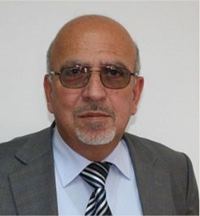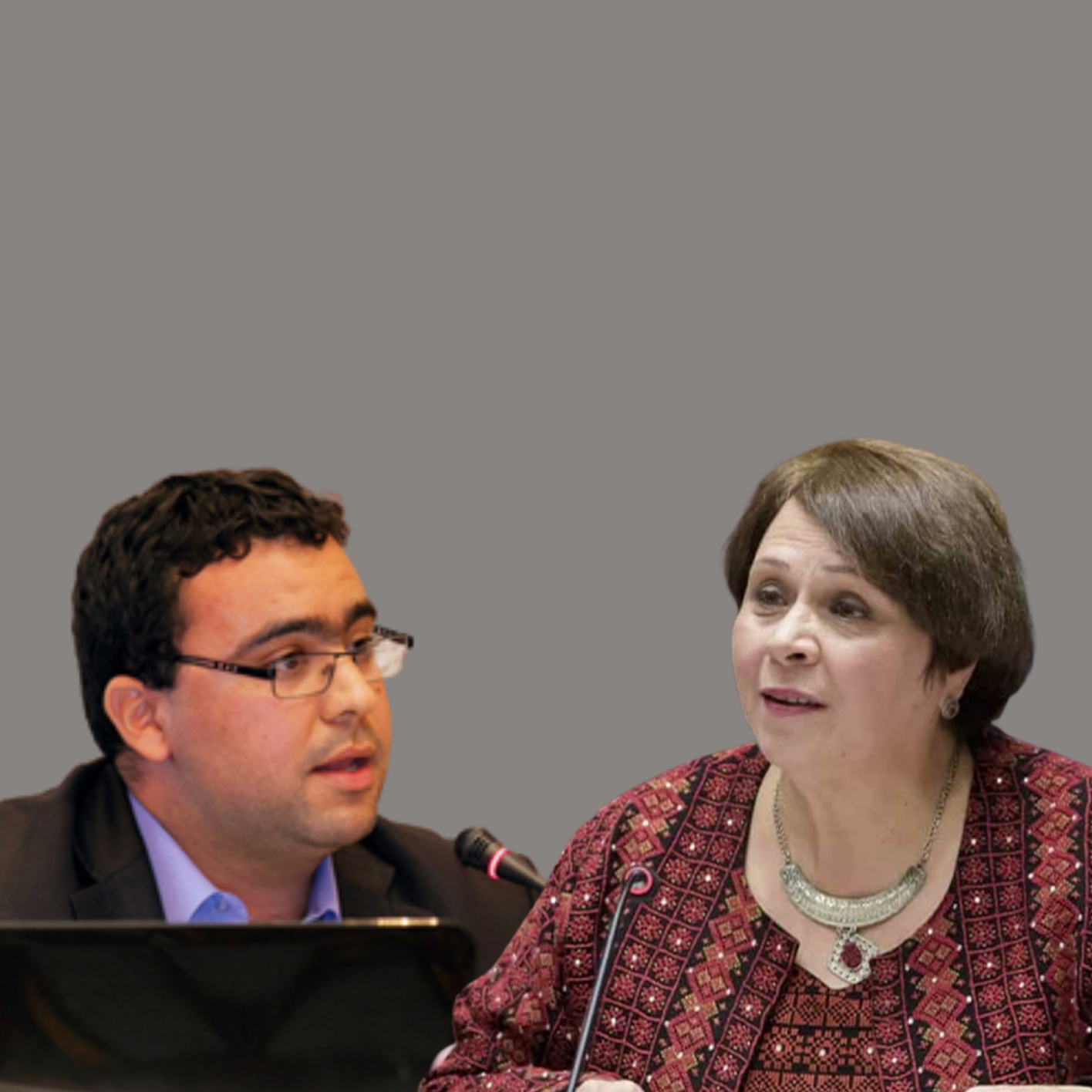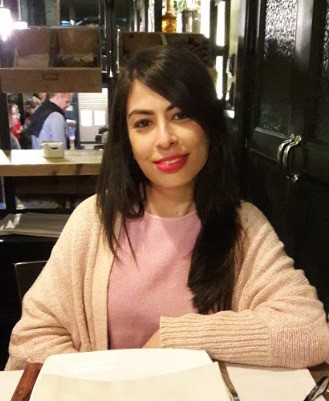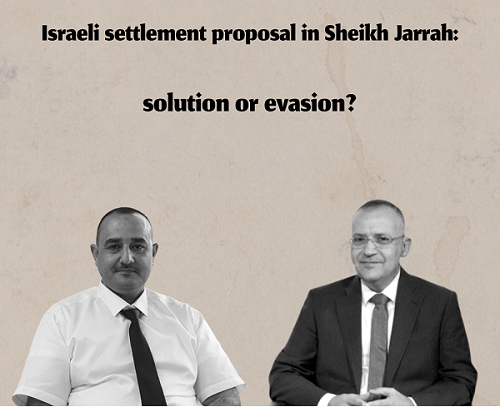
- The statement of the US Secretary of State on settlements is an attempt to save Netanyahu and Trump from downfall
- Netanyahu is prepared to wage a military campaign in the north and in the Gaza Strip to guarantee he is not put on trial
- Our battle with the Israelis will be in the international arena; we must pursue Israeli officials as war criminals
- Where are we in terms of creating projects to ban work inside the settlements?
Introduction:
Dr. Jad Ishaaq, Director of ARIJ [The Applied Research Institute – Jerusalem] described the statement of US Secretary of State Mike Pompeo on Israeli settlements in the West Bank as an attempt by the US administration to offer a service to Netanyahu and Israel and at the same time to try and save both the Israeli Prime Minister and US President Donald Trump from a downfall given that both men could be ousted from power.
Ishaaq said the main battle with the Israelis in confronting settlement expansion will be in the international arena, saying settlers have a strong army on the ground and powerful political power that renders the results of our popular resistance inefficient and weak.
Following is the full text of the interview conducted with Dr. Ishaaq by “Hosted by MIFTAH”:
**What is your take on the timing of the US Secretary of State Mike Pompeo, who considered settlements legal and legitimate?
I think the timing stems from the current US administration’s knowledge that the chance President Trump will be reelected is dwindling. Therefore Trump wanted to offer a service to Netanyahu and Israel. This administration has offered Israel much more than the previous one, shunning all international resolutions.
This is why Pompeo offered Israel a gift, saying settlements are not inconsistent with international law. However, the response to this decision was that 170 countries in the UN voted to renew UNRWA’s mandate. The second slap in the face of the US administration was when the same number of countries voted in favor of the Palestinian people’s right to self-determination. That is why I don’t think this decision is worth the ink with which it is written as long as the Palestinians adhere to international legitimacy. I know Israel is always trying to say that this land is not occupied, thus canceled out the term “occupied Palestinian territories” and started using the term Gaza and the West Bank. What’s more, there is no indication to the fact that the annexation of Jerusalem to Israel was ever recognized. At the US State Department, reference to the Palestinian territories and even to the Syrian Golan Heights was changed to no longer call it occupied land. At the same time, UNSCR 2334 was passed two years ago, which deems settlements to be illegal. While it is true that the US did not vote in favor of the resolution, it abstained from voting, which helped to get it passed at the Security Council.
**Do you think this decision will push Israeli Prime Minister Benjamin Netanyahu, who has his own problems because of the corruption charges against him, to take other political steps regarding settlements and the annexation of the Jordan Valley?
There is no doubt Netanyahu fully understands that his political end is near, especially after his indictment by the Israeli Attorney General. That is why he is seeking to take steps that would guarantee he stays in power in spite of his own party’s untenable situation. I am afraid that in his remaining days, Netanyahu will take a step that is even more dangerous than annexing the Jordan Valley. I don’t rule out that he will wage a military campaign in the north and also in the Gaza Strip because such a step could be the only way to guarantee he is not put on trial. As for the decision to annex the Jordan Valley, this is like all the other meaningless decisions. Everyone knows this is occupied territory and that UNSCR 242 states "inadmissibility of the acquisition of territory by war”. They are trying to market the idea that the land of the West Bank in particular was never officially annexed to Jordan. They never recognized the outcomes of the Jericho Conference at the time and said that when Jordan presented this to the UN as a resolution to annex the West Bank to the East Bank, only Pakistan and Britain I believe, voted in favor, which is why Israel says this is “disputed land.”
I think we should not have disengaged with Jordan and insisted on keeping the West Bank under Jordanian jurisdiction until a Palestinian state is established because states can inherit other states. This is what Israel claims – that there was never a state in place. However, if we go back to Resolution 181, the responsibility of the UN was to establish an Arab state just like it did when Israel was established. At the time, Israel sent a letter to the UN saying “we recognize the partition plan but these are the borders of our state”. However, it seems nobody cares because now we only speak about the 1967 borders; I think we need to reconsider this premise.
**What are the repercussions on the ground for Palestinians? How dangerous is Pompeo’s decision on the remaining land in the West Bank?
Israel legitimized the settlement process through laws it passed through its Knesset, when it said the takeover of privately-owned Palestinian land for settlement purposes is permissible. This was followed by another decision to turn any disputes over land to the court system, which says that if the land was confiscated with “good intentions” settlers were allowed to use it. The most recent of these laws was the nation-state law and the decision to annex settlement blocs. These are all laws or bills ratified by the Israeli Knesset, all of which are in violation of international law.
Our battle with the Israelis will be in the international arena more than on the ground, because the battle on the ground is too weak. They have a strong Israeli army that can counter any Palestinian attempts at popular campaigns even though these campaigns are confined to certain areas such as Bilin, Kufr Qaddum and Sourif. Still, this is not enough.
All of the confiscation orders have signature of actual people. We know which settlement the settlers who assault the land and cut down the trees come from, most of whom carry dual citizenship. In the Nablus region, they are Americans. Here we should ask ourselves what tools we can use against these war criminals. This needs a new approach, a large pool of Palestinian and foreign lawyers and supporters of the Palestinians. All we have to do is look at what the settlement organization “Regavim” does against Palestinians at the global level. How do we compare? We must wage a legal campaign in the countries that grant settlers dual citizenship against any person who signs off on a demolition order, a land confiscation order or anyone who carries out an assault on our people. But to do this, the Palestinians must be united instead of wasting our time on disputes between Fatah and Hamas. We must unite because Israel wants to turn us into the Native Americans of the 21st century.
**Do you think political will is moving in this direction? Do you think the Palestinian foreign ministry is doing enough in this regard?
It is not within the jurisdiction of the Ministry of Foreign Affairs to legally pursue them. The ministry notifies the countries of what is going on and condemns Israeli measures. But we need something else. We need another system and another group similar to “Regavim” and the American associations that donate to Israel and which are registered in the United States as nonprofit organizations. These are the institutions that need to be legally pursued. We must start to dry out the funding sources of settler terror, but this needs a new approach, follow-up and contacts. We also need the efforts of Palestinians in the United States whose land was confiscated to file lawsuits with US courts and demand compensation and restoration of their land. However, like I said, this means we need to know our enemy and realize that all of the disputes between Fatah and Hamas are secondary because our main conflict is with the occupation and we must unite to confront it.
**Doesn’t this confrontation now include the current US administration?
Yes, of course. The best example is when 165 members of Congress signed a statement condemning Pompeo’s announcement. Another example is what is taking place in American universities, which we can build on. We saw what happened at Harvard University when students boycotted the Israeli ambassador to the UN who came to speak about the legitimacy of settlements. They all got up and left the lecture hall. There is a generation of Palestinian youths in the Diaspora and around the world who we cannot disappoint. We must offer them everything we have so they can fight at the international level for the cause.
**What are the practical mechanisms the Palestinian leadership can use to confront the US administration, which is financially and politically embargoing the leadership?
US assistance does not impact us anyway. Most of the aid was used by the implementing agencies, which would deduct 60% of the budget. These institutions were interested in establishing infrastructure projects that basically serve settlements. Even the aid earmarked for Jerusalem hospitals and which the US administration cut did not have much of an impact on them; they continued to offer their services. We saw how ordinary citizens rose to the occasion to help Augusta Victoria Hospital when it declared a financial crisis. The people donated from their own pockets.
We are a generous people and are still capable of giving more. However, there is a huge gap between the political leadership and the street but there is still time to bridge it. The leadership should be able to rally the people around it because they want to see a leadership that put the interests of the homeland above everything else, far removed from factional or personal interests. We want to see ministers in the front lines of demonstrations. We want to see all the factions, including Hamas and Islamic Jihad hand in hand and we want to see one Palestinian flag being raised and thousands confronting the occupation everywhere.
**Are you satisfied with the European position regarding the latest developments? What do we need from Europe?
Yes, I am. I know that the EU cannot have a united foreign policy because this would need a consensus. However, there have been some good steps, including the decision to label settlement products. The Netherlands, for example, tried not to abide by this, but just a few days ago, our ambassador there said the government would commit to the decision. The remaining EU countries should not accept the role of financer imposed on them by the United States rather than being a player. At the same time, there is an emergence of populist leaders in Europe. At present, their reemergence is related to the issue of immigrants, but I am confident such trends will recede again because populism is racist and the Europeans know what racism leads to. Palestinian communities in Europe must also work to strengthen their ties with social, progressive and socialist parties to form strong nuclei in lobbying organizations.
**Do you think the European position might move from labeling settlement products to banning their import to EU countries?
This depends on us. Take for example the wine from the settlement of “Psagot” which is marketed in Europe. A lawsuit was filed against Psagot and the marketers tried to allege that their factory was built on land that did not belong to the settlement. But they failed in their legal battle; the Israeli government demanded them not to continue with their legal procedures because the outcome would constitute a legal precedent that could be applied to other factories built in settlements. On our part, we called on the UN and its Secretary General to publish the names of companies that work in settlements but it is till dragging its feet. Still, we must insist that the list is released and that the process of boycotting all companies that work in settlements begins. Also, every one of these company’s agents in the Arab world must be exposed. I do not want to frustrate the Palestinian street but let’s not make it sound like Pompeo’s decision is our fate; not Pompeo, Trump nor anyone else can determine our destiny. We are the ones in the right and we will regain it.
**If we talk about numbers and percentages, what is the reality on the ground in terms of settlements in the occupied Palestinian territories?
What Israel tries to do is connect settlements through its settlement outposts into huge settlement blocs, which now constitute 75% of Area C, including the Jordan Valley, or 45% of the area of the West Bank. I would not be surprised if Israel recognized whatever area is left as an independent Palestinian entity just like I would not rule out Trump recognizing the same thing.
This is not a formula we can accept; Israel was able to push 92% of the Palestinian people into Areas A and B, which equals 40% of the area of the West Bank. Hence, there is nothing that would make this entity viable in any way. You can call it whatever you want – a conglomeration of empires, of reservations, of canton. The point is, such a reality cannot be accepted. We must insist on international legitimacy, which calls for a Palestinian state on the 1967 borders.
**Do the measures taken by Prime Minister Mohammed Shtayeh’s government contribute to supporting the steadfastness of citizens, farmers and industrialists?
Yes, of course. We cannot continue to be economically subordinate to Israel, whose annual income per capita is $40,000 as opposed to $1,500 annual per capita in Palestine. Why do we not start gradually disengaging from the occupation? The problem is that Israel is playing the game as follows: At present, it is the second largest employer for our laborers inside Israel and the settlements. Where are we in terms of creating projects to prevent labor in the settlements? Furthermore, there are 6,000 Palestinian women working in the Jordan Valley settlements. With just two small factories for major agricultural projects, we could employ that many of our women. This would help to dry up the sources of settlement terror. Let Israel bring its workers from Romania or China. I don’t think they would accept to work in an occupying state.
**What about the official Arab regimes and the way some have branched out into economic relationships with Israel? Is this still the right climate for confronting the occupation’s measures in the Palestinian territories?
I distinguish between the Arab peoples and their official regimes. Take Tunisia for example. Not long ago, students raised Palestinian flags over their schools. The same goes for Iraq and even Yemen, which is suffering from a terrible humanitarian crisis. Nonetheless, the people took to the streets in solidarity with the Palestinians. Our problem is that the real Arab Spring has not yet developed. Perhaps the so-called Arab Spring did begin a few years back, but the old leaderships and regimes returned and took up their positions once again. Even so, today there are movements at the Arab level we wish we had. In Sudan, they recently succeeded in forming a transitional government; also look what happened in Algeria and Lebanon. I am confident that the next Arab Spring will lead to a radical change in the political systems in the Arab world, characterized by democracy and good governance. Unfortunately, there is a huge gap between the people and the regimes that govern them and those who hold the capital. I watch Lebanese television and I am proud of the civilized revolution the Lebanese people are leading. They are saying: no to sectarianism, no to factionalism. Why are we not encouraging such movements and insisting on them?
**Do you think this could apply to the Palestinian case in spite of the fragmentation and division within it?
I think so. Our problem is that the occupation prevents a real Palestinian Spring.








